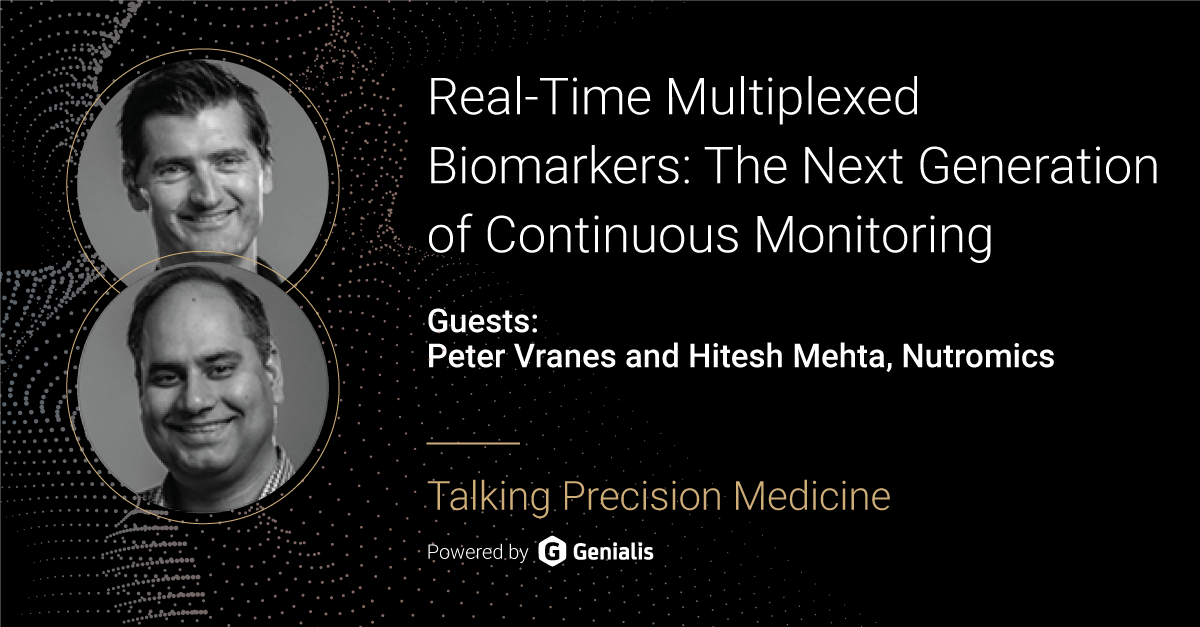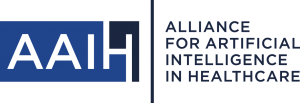Welcome to the Talking Precision Medicine podcast. In this series, we sit down with experts on the application of AI and big data analytics in the drug discovery space. Our guests are innovators, business decision makers and thought leaders at the intersection of data and therapeutics. We discuss the promise, practice, challenges, and myths of AI in precision medicine. This show is brought to you by Genialis, and Rafael, our CEO, is your host.
Genialis is focused on data integration and predictive modeling of disease biology to help accelerate the discovery and de-risk the development of novel therapeutics.
Earlier this summer, Genialis CEO Rafael Rosengarten sat down with Peter Vranes and Hitesh Mehta, co-founders of Nutromics. Nutromics is developing a next generation lab-on-skin, a wearable device for continuous monitoring of health-critical biomarkers.
Let’s get right to it.
Links:
Episode highlights:
When trying to help a patient, clinicians are often relying on a single data point in time and they have to make a decision quickly. Often there’s a significant lag time with data and a lack of frequent data points to help better understand the clinical situation. This can result in severe complications and mortality.
Nutromics’ main product is a smart skin patch – a small and unobtrusive wearable medical device that enables important biomarker data to be captured continuously, and wirelessly transmitted to a software application. It is similar to a well known continuous glucose monitor but instead of just measuring a single parameter this is a platform sensor that can measure any molecular target just under the surface of the skin: proteins, hormones, drugs, metabolites, etc.
This so-called lab-on-skin solution is a merger of two technologies: a microneedle array and an aptamer-based sensor coating solution at the end of the needles, that was developed by Professor Kevin W. Plaxco at UCSB and is now licensed by Nutromics. Each microneedle can be a different sensor, which opens up a world of opportunities in healthcare where information is required quickly.
The information from the patch is streamed to a cloud where a number of machine learning, AI and analytics can turn the data points into actionable insights for the clinicians. Currently the users can see the data on their mobile phones but over time the plan is to integrate the generated information into the health record systems.
Nutromics is currently focusing on a precision medicine approach around therapeutic drug monitoring—safety for drug dosing—focusing on vancomycin, a very common antibiotic medication used to treat a number of bacterial infections. In the US, 6.3 million patients get vancomycin every year but a staggering 60% of the doses don’t get in the therapeutic range. 10-20% of patients get a toxic dose that often leads to an acute kidney injury and on the other hand underdosing can result in serious infections.
There are also a lot of other drugs that can result in acute kidney injury. Currently over 800 million people suffer from some stage of chronic kidney disease globally and this is double the size of the diabetes market today. This is largely a data-free zone where patients have no monitoring support and no technology to make sure they don’t progress to a worse condition.
This kind of product can also help pharma companies monitor drugs in clinical trials as well as codevelop drugs that traditionally wouldn’t get through the regulatory path because they’ve got high toxicity or there’s issues because of the way they are dosed. With real time continuous monitoring these drugs could be administered safely.
In consumer space, real time continuous monitoring of various molecular targets can help accelerate proactive healthcare by promoting behavioural change and consequently preventing lifestyle related chronic diseases like type 2 diabetes and cardiovascular diseases.


